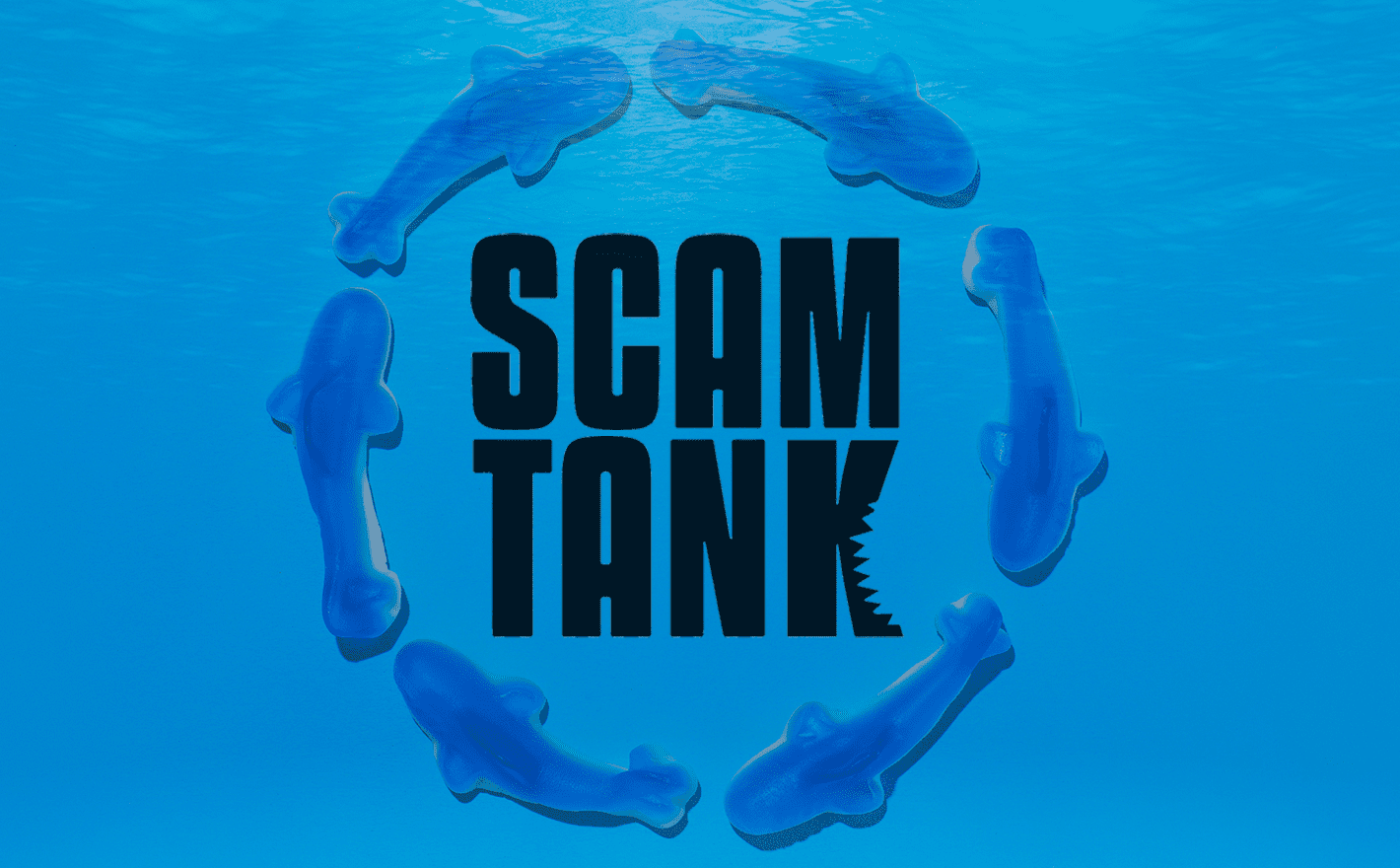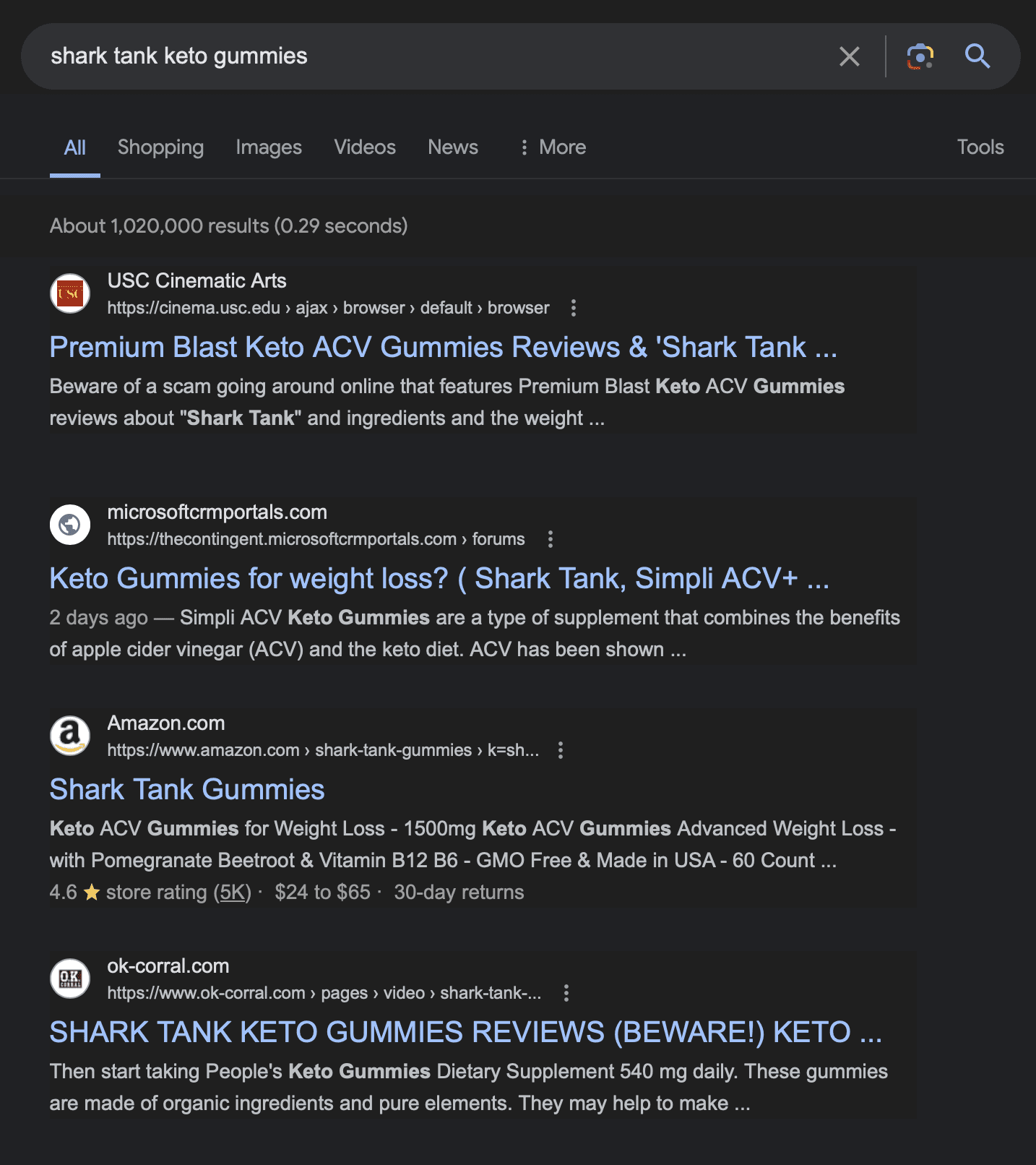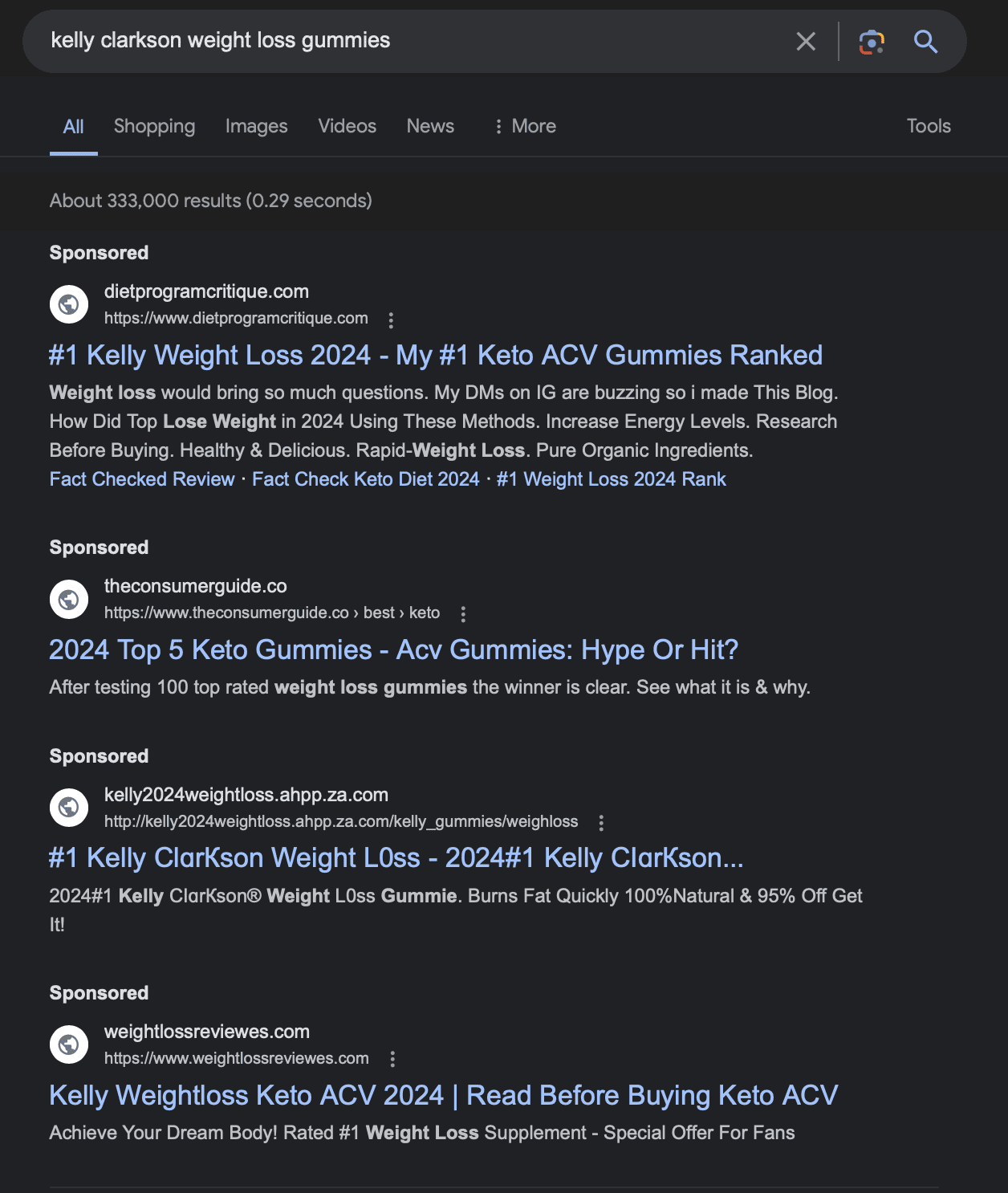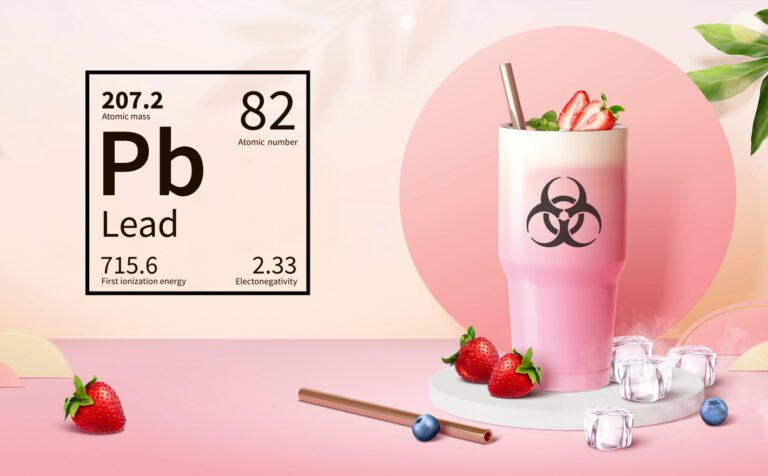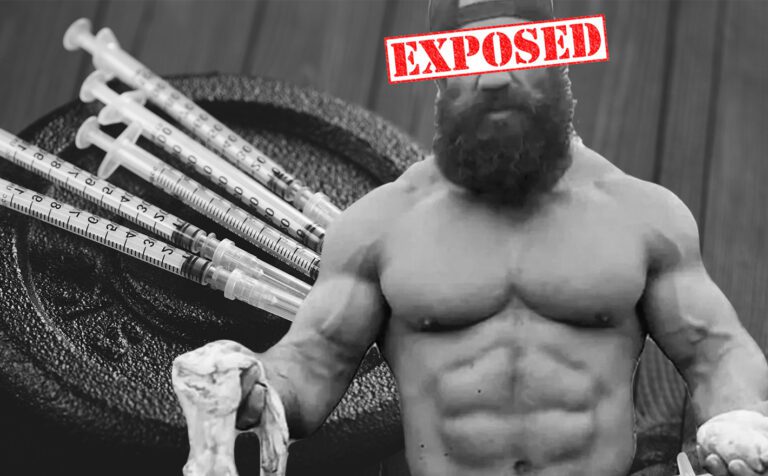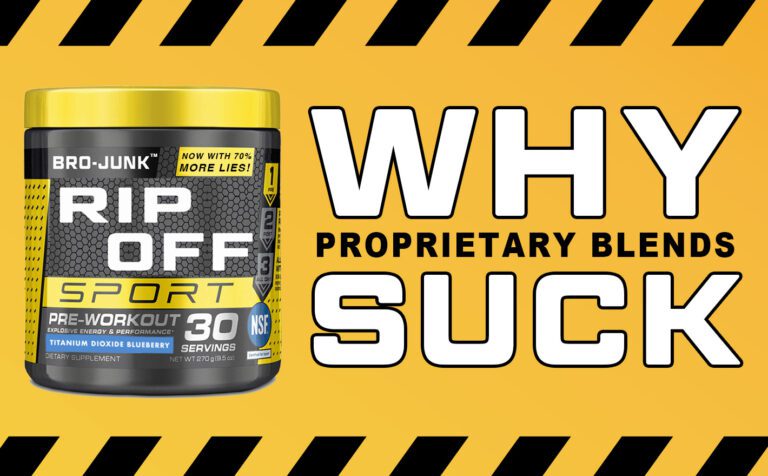Have you ever seen one of these scam ads for Shark Tank keto gummies or CBD edibles? Maybe it said it was “Shark Tank’s biggest deal in history,” that Kelly Clarkson used them to “shed 35 lbs in just 3 weeks,” or that they’ll instantly fix your erectile dysfunction?
Welcome to the Wild West of CBD and weight loss gummies, where fake endorsements are rampant and fraud is the status quo. Both weight loss and CBD products have always been surrounded by high levels of deceptive marketing, but that goes doubly for gummies.
Some of these products even use the term ‘miracle root gummies’, like the ones mentioned in this article that shows how country music stars like Luke Combs and Tim McGraw were targeted by these online fraudsters. If there were ever a word that screams “This is snake oil,” it would be ‘miracle’.
Unscrupulous supplement companies have made ridiculous product claims since time immemorial, but fake affiliations are on a massive upswing, emboldened not just by online marketing, but also artificial intelligence.
Singer-songwriter Kelly Clarkson is particularly aware of this. After Clarkson lost a substantial amount of weight recently by changing her diet, scammers capitalized on this by using AI to generate a fake video where she appears to claim that it was all from these miraculous keto gummies.
The technological progression of these deep fakes is awe-inspiring. Some of them are nearly indistinguishable from reality, but this one not so much. Most people who watch it carefully can probably tell her lip movements aren’t quite right. Older folks, however, are far less likely to catch these signs, let alone even know that this technology exists in the first place.
That’s one among many reasons that these scams are so atrocious: they’re taking advantage of the elderly. Talk about evil.
The AARP is very much aware of this, as they recently published an article warning senior citizens about the many weight loss gummies using fake endorsements, saying:
“Scammers are well aware that a thumbs-up from the sharks can mean big money. So they are relentless in their use of fake Shark Tank seals of approval to sell products — sometimes hair-growth or libido-enhancement supplements, but particularly those claiming to promote weight loss. The majority, for some reason, are various brands of keto gummies.”
(See the last section of this article for links you can use to report scams as well as a list of red flags)
Entrepreneur and Shark Tank star Lori Greiner has also warned about these ads on her website.
Despite the fact that Greiner posted that article three years ago–not to mention the slew of articles that have exposed the scam like this one from USA Today–over 150,000 people are still searching Google for Shark Tank gummies every month. That’s almost 2 million searches a year for a product endorsement that we’ve known was a hoax since 2021.
Here’s some more search data (in approximate searches per month):
- Oprah Gummies – 52,000
- Dr. Oz Gummies – 50,000
- Kelly Clarkson Gummies – 28,000
If you totaled up all the smaller quantities for products falsely connected to other celebrities like Kevin Costner, Sanjay Gupta, Luke Combs, and countless others, you’d rightly conclude that millions of people are probably still falling for these scams.
Online searches still show lots of ads for CBD and weight loss gummy scams
If we give them the benefit of the doubt, we could assume that search engines are doing their best to combat these scams, but if that’s true, it’s not remotely enough.
We performed various searches pertaining to these scams and were shocked by what we found.
For example, check out these search results:
The first, second, and third hits were all scam ads, but notice the third one. What the heck’s going on here, Amazon? We’ll get to that in the next section, but first let’s look at one more example.
Here’s what happened when we searched for “Kelly Clarkson weight loss gummies”:
Here we’ve got four ads in a row, which is weird. Two use only her first name, but one uses her full name. Take another look though. Notice anything strange about that ‘K’ in ‘Clarkson’?
Yep, that’s a character from a foreign alphabet that looks like a ‘K’. Not to mention that the ‘O’ in ‘Loss’ is actually a zero. Very clever, guys. The ® symbol after her name is also a nice touch.
Following that, there was a series of non-sponsored, fully organic results, all of which were scam pages promoting these keto gummies and pretending to be from various reputable sources.
These were the next 6 results, in order:
- A page that looks like it’s from Texas A&M University
- A page that looks like it’s from the University of Arizona
- Another one pretending to be from Texas A&M
- A page pretending to be Microsoft
- A sham website called ‘Center for Landscape Conservation Planning’
- An Amazon review for a keto gummy that mentions Kelly Clarkson and made ridiculous claims about how much weight was lost
As mentioned, there are plenty of articles that warn people about these fraudulent ads, but nowhere in the top ten hits could we find any of them. When was the last time you scrolled deeper than the first ten results after you Googled something?
Statistically, only a tiny percentage of people do that.
The situation with the CBD gummy scams isn’t much better. When we searched for Shark Tank CBD gummies, we got the USA Today that debunks them as the first hit, but right after that, it was just more noise from the scammers.
Amazon fails to prevent CBD and keto gummy scams
We were even more shocked by our Amazon search function research. What’s particularly surprising is how it will auto-populate phrases that perpetuate these scams.
Here are some crazy examples of how Amazon’s autocomplete behaved:
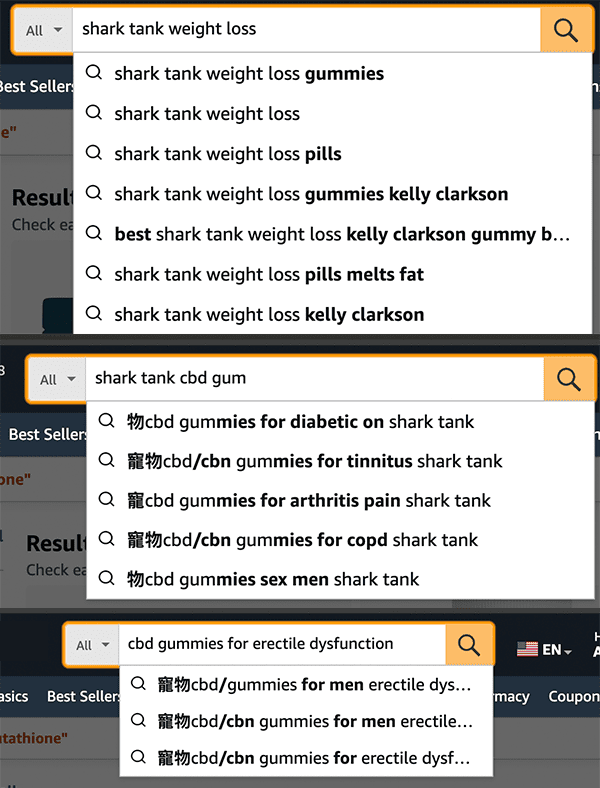
Oh my what a dumpter fire. There’s just so much wrong with this, such as:
- Falsely associating Shark Tank with weight loss & CBD gummies
- Perpetuating the myth that Kelly Clarkson endorses these products
- Implying that CBD can treat erectile dysfunction, arthritis, and diabetes
- Suggesting that Amazon even sells CBD products in the first place
This last one is the craziest. Take a careful look at the last search. We typed in “CBD gummies for erectile dysfunction,” but–as you can see–what Amazon’s search populated actually says ‘CDB’, not ‘CBD’. Boy are these guys devious.
It’s actually against Amazon’s policy to sell CBD products, but you wouldn’t know that from searching their inventory. If you simply type ‘CBD gummies’ into the search bar, instead of getting a notice from them that tells you they don’t sell them, you’ll see a ton of products calling themselves ‘hemp gummies’ and clearly pretending to be CBD products.
These ‘hemp gummies’ don’t have any CBD, but nearly all of them market themselves as if they do. Despite the fact that they just contain the same hemp seed oil that you’d buy from the grocery store and use to make salad dressing, they claim to treat inflammation, anxiety, and all sorts of other conditions.
A number of these very scammy products even go so far as to make physically impossible claims about how much is in them. While we won’t point any fingers to specific products, we’ll tell you that within the first page or two of results, we found several that did this.
One of these products actually claimed that it contains ‘15,000,000 mg’ right on the label! There are no words to describe just how insane this is.
Of course, it doesn’t say 15,000,000 mg of what, but it’s clear that the implication is that’s how much CBD is in there. If you do the math, that’s 15 kilograms.
Divide that by 60 gummies per bottle, and that means that each of these “hemp gummies” would weigh as much as a large potato (just over a half pound). If this claim was accurate, the bottle would be the size of a mini fridge. The shipping alone would cost twice as much as the product.
So yeah, it doesn’t look like these gummy scams are going anywhere anytime soon.
Keto & CBD gummies: still the 2 biggest supplement scams on the Internet
Make no mistake: the only weight you’ll lose if you buy one of these keto gummies is from your pocket book.
Of course, not all keto or apple cider vinegar products are necessarily bad, though–according to the research–even the best among them are unlikely to produce anything more than a tiny change in your body fat to the tune of a few pounds after a couple months…which you’ll probably gain back once you stop using them.
Some of these weight loss gummies indeed come from fully reputable companies that have just hopped on a ridiculous, trendy bandwagon, but they’ve got some stiff competition from the hordes of thugs dead set on exploiting vulnerable groups like the elderly.
The same goes for CBD products. Though that market is clearly flooded with bad actors, there are a few good companies out there, and despite the fact that CBD is arguably the most over-hyped supplement of all-time, it does have its uses.
The subterfuge with which these products are often marketed is so prevalent that both the Federal Trade Commission and the Better Business Bureau have taken action to spread awareness.
FTC & Better Business Bureau crack down on fraudulent weight loss and CBD gummies
The use of Shark Tank to promote weight loss gummies is common enough that the Federal Trade Commission (FTC) has even warned about it.
CBD scams have also gotten attention from both the FTC and the Better Business Bureau (BBB), who published an article in 2022 that warns against hemp gummies claiming to be promoted by Shark Tank, Kevin Costner, Katie Couric, and Mayim Bialik, the star of the popular 90s sitcom ‘Blossom’.
If you go to the BBB website and search their Scam Tracker for the phrase “Shark Tank,” you get a whopping 350 hits. If you take a look at these complaints, you’ll find that most of them refer to either keto or CBD gummies.
For example, one person filed a complaint that said they didn’t lose any weight, figured out that the Shark Tank endorsement was fake, and then–instead of being given a full refund like the ad said–had their card charged multiple times after trying to cancel.
In the end, they lost $240 and even had to get a new bank card.
We read through over a hundred of these complaints, and many of them look just like the one above. Not only do these companies make false claims about what their products can do and who they’re endorsed by, but they often overcharge, sign people up for subscriptions without their consent, and misrepresent their return policies.
As expected, the BBB Scam Tracker is also filled with tons of examples from CBD products. In fact, if you search their database for ‘CBD’, you get 720 hits. By comparison, if you search for ‘turmeric’, a supplement that’s been around for decades longer than CBD, you only get 12 results.
Real weight loss requires real work, but supplements do play a role
The majority of Americans need to lose weight these days, and it’s way too easy for supplement companies to take advantage of the millions of us who just want a quick fix. Real weight loss takes real work in the form of diet and lifestyle changes, but supplements do have a place, though in a more indirect way.
If you really want to lose weight, then use clinically-researched adaptogens like Ashwagandha and Tongkat Ali to give you the extra energy you need to work out, and to reduce the stress hormones that often lead to overeating (both are backed by human clinical studies showing reductions in the stress hormone cortisol).
And if you’re getting really serious about exercise, then an ultra-clean pre-workout like Chad Mode can help. Not only did we leave out all artificial dyes, flavors, sweeteners, and preservatives, but we also avoided the so-called ‘natural flavors’ that are anything but.
How to avoid scams and vet companies: Red Flags & Green Flags to look out for
First of all, if you know any senior citizens, be sure to share this article with them, along with the resources we’ve shared. Let them know they can submit a complaint to the BBB (link here) or FTC (link here) if they’ve been the victim of a scam, and also be sure to warn them about deep fakes.
Second, it’s important to know that using disease language to market your products is illegal according to the FDA. Scammers almost always do this.
For example, you can say your product “supports blood sugar health,” but you can’t say that it treats diabetes. If an ad says anything about erectile dysfunction, diabetes, arthritis, depression, or any other disease, then it’s against FDA regulations and therefore highly suspect. The same is true if an ad compares a supplement to a prescription drug, which is also very illegal.
Here are some more red flags to look out for:
- Celebrity endorsements of any kind (these are rare and each must be carefully vetted)
- Making wild claims about results, like “lost 35 lbs in 3 weeks”
- Pages that have very little product information and just a form for your payment info
- Products that don’t have a clear company name that would allow you to research and vet them
This last one is crucial. Many of these scam products don’t even have a proper company name or website. Rather, the entire site is just a poorly made landing page.
It’s also helpful to look up each company on Trustpilot before you buy, as all of their reviews are 100% independent and can’t be altered by the company. This is one of the top green flags to look for.
CHOQ has an average rating of 4.7 stars from nearly 5,000 reviews on Trustpilot. A full 93% of our ratings are 5 stars, putting us far above most companies.
Here are some other green flags:
- Commonly uses ingredients backed by human clinical research
- Practices full-disclosure labeling (no proprietary blends, all active ingredient quantities listed)
- Makes discontinuing subscriptions fast & effortless
- Avoids toxic chemicals like synthetic dyes, flavors, sweeteners, & preservatives
- Formulated by licensed medical practitioners or people with advanced degrees in nutrition
- Publishes articles that incorporate peer-reviewed research on health & nutrition
- Has professional customer service reps willing to answer all questions, no matter how technical
CHOQ meets all of these criteria, which is rare.
That’s why we have such incredibly high reviews on Trustpilot. Of course, we don’t pretend to be the only company that has all of these green flags, but they’re few and far between these days.
If you’d like to learn more about supplement transparency and why we’re one of the few companies that practice true full disclosure labeling, be sure to check out this article.
